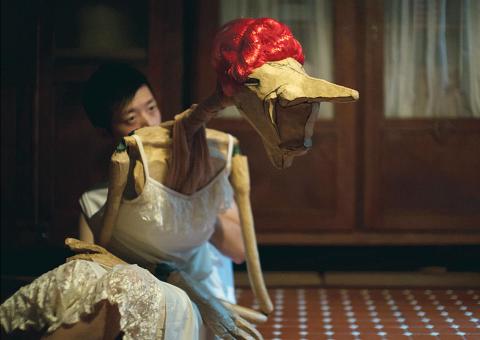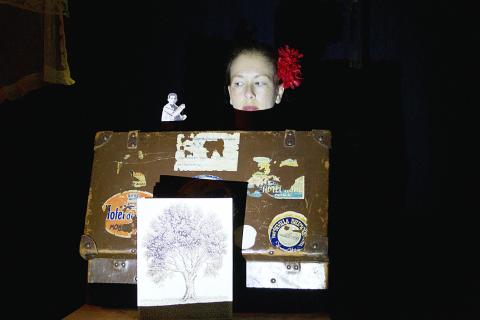It is a common complaint that small, intimate theater venues are few and far between in Taipei, but this is changing as theater companies and curators seek out unconventional venues to stage exhibitions and performances. The Close To You International Puppet Festival (超親密小戲節), now in its third year, has embraced the city’s many coffee shops, bars and “art spaces” to bring Taipei audiences a different kind of theater experience from that found in major auditoriums.
The festival, which opens today and runs until Oct. 21, presents nine shows at nine venues around the city. Although it bills itself as a puppet festival, its definition of puppetry is eclectic in the extreme, and the subject matter ranges from magical rabbits to reflections on the Holocaust. The participants are equally diverse, from established puppeteers to artists, and theater technicians of various stripes who wish to experiment with the use of puppets as an expressive medium.
Event curator and artistic director of Flying Group Theater (飛人集社劇團) Shih Pei-yu (石佩玉) told the Taipei Times that one of the fundamentals of the festival was that people not directly associated with puppetry could reach out beyond their own media. “You might have a background in performance art or music, but my aim is for people to work together, and use their expertise within the realm of puppetry,” she said. “The festival is a creative platform where people can experiment with puppetry.”

Photo Courtesy of Flying Group Theater
The festival also includes a masterclass on “how to transform normal things in our life into puppetry creation,” led by puppeteers Chris Green and Erin Orr.
Shih said that she got the idea for the festival while studying in Europe, when she had an opportunity to experience theater in small spaces, “even in people’s living rooms.”
“In Taiwan, I probably would not be welcome into people’s homes,” she said, “but there are now many multifunctional spaces in Taipei which would serve equally well.”

Photo Courtesy of Flying Group Theater
Each show is about 20 minutes, and each event is a block of three shows at different venues centered on a specific area. The Shida Commercial District (師大商圈), which played an important role in the development of the festival, has been abandoned as a result of the recent controversy over the area’s development. The Yong Kang Street Area (永康街區) continues as part of the festival, and two new areas have this year been included: the Mingsheng Community (民生社區) and the Renai Circle (仁愛圓環). Audiences are required to walk from one venue to the next.
“Moving from one venue to another, people will relax, even talk together,” Shih said. “Going to the theater does not have to be such a serious and constricted activity. There will even be a guide to take the audience onto the next venue, and they will provide a commentary about the area along the way.”
This is also a chance for performers interested or directly involved in puppetry to create their own personal works that might be distinct from the repertoire of the company or companies they work for. Artistic director of the Taiyuan Puppet Theater (台原偶戲團) Robin Ruizendaal takes to the stage for a very personal piece of theater that looks into the lives of children who died as a result of the Holocaust in I Have a Name (我有名字). As part of the same series of performances at the Renai Circle, artists Tseng Yen-ting (曾彥婷) and Chen Chia-hui (陳佳慧) use flour, water and an oven to bring their world of puppetry alive in a show titled The Greatest Thing Since The Bread (麵包以後).
Three of the shows, by foreign artists, are works that have already been produced. There is The Yellow “O” from Thailand (part of the Yong Kang program), A Chance Shadow. Part II: Federico Garcia Lorca from the US (part of the Mingsheng program), and Alice’s Tea Party from Israel (part of the Renai program). Local performances are all new shows premiering at the festival.
“We are really happy that a couple of the shows created for previous events were subsequently expanded or became established parts of a repertoire,” Shih said. The festival is still in its early stages of development, but Shih said there was plenty of potential for an event using this format. “We hope that we might take it to other cities, such as Tainan, or experiment with other genres, like poetry, to see where this kind of experimentation can take us,” Shih said. “The core idea of the festival is really quite organic, and can grow in all sorts of directions.”

Taiwan has next to no political engagement in Myanmar, either with the ruling military junta nor the dozens of armed groups who’ve in the last five years taken over around two-thirds of the nation’s territory in a sprawling, patchwork civil war. But early last month, the leader of one relatively minor Burmese revolutionary faction, General Nerdah Bomya, who is also an alleged war criminal, made a low key visit to Taipei, where he met with a member of President William Lai’s (賴清德) staff, a retired Taiwanese military official and several academics. “I feel like Taiwan is a good example of

March 2 to March 8 Gunfire rang out along the shore of the frontline island of Lieyu (烈嶼) on a foggy afternoon on March 7, 1987. By the time it was over, about 20 unarmed Vietnamese refugees — men, women, elderly and children — were dead. They were hastily buried, followed by decades of silence. Months later, opposition politicians and journalists tried to uncover what had happened, but conflicting accounts only deepened the confusion. One version suggested that government troops had mistakenly killed their own operatives attempting to return home from Vietnam. The military maintained that the

Before the last section of the round-the-island railway was electrified, one old blue train still chugged back and forth between Pingtung County’s Fangliao (枋寮) and Taitung (台東) stations once a day. It was so slow, was so hot (it had no air conditioning) and covered such a short distance, that the low fare still failed to attract many riders. This relic of the past was finally retired when the South Link Line was fully electrified on Dec. 23, 2020. A wave of nostalgia surrounded the termination of the Ordinary Train service, as these train carriages had been in use for decades

Lori Sepich smoked for years and sometimes skipped taking her blood pressure medicine. But she never thought she’d have a heart attack. The possibility “just wasn’t registering with me,” said the 64-year-old from Memphis, Tennessee, who suffered two of them 13 years apart. She’s far from alone. More than 60 million women in the US live with cardiovascular disease, which includes heart disease as well as stroke, heart failure and atrial fibrillation. And despite the myth that heart attacks mostly strike men, women are vulnerable too. Overall in the US, 1 in 5 women dies of cardiovascular disease each year, 37,000 of them